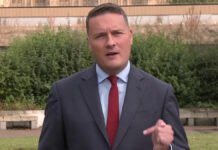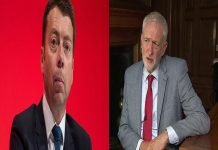“There is very significant public interest in this matter… the implications of the allegations are that individuals and/or the Conservative Party may have committed deliberate acts intended to circumvent the party and election finance rules… These allegations go to the very heart of our Democracy.” – Judge Barron.
IN THE FOLKESTONE MAGISTRATES’ COURT IN THE MATTER OF AN APPLICATION UNDER SECTION 176 OF THE REPRESENTATION OF THE PEOPLE ACT 1983 DECISION THE APPLICATION
1. This is an application brought by Kent Police under section 176 of the Representation of the People Act 1983 (“the Act”) to extend the time for prosecution of offences under section 81, 82 and 84 of the Act. There is also a request for an order that Thanet District Council retain all relevant documents.
2. The Act provides that proceedings for offences must be commenced within one year after the offence was committed but a magistrates’ court may extend the time to commence proceedings to not more than 24 months after the offence was committed.
3. In order to the extend the time limit I must be satisfied. That there are exceptional circumstances which justify the granting of the application, and b. That there has been no undue delay in the investigation of the offence to which the application relates.
THE APPLICANTS AND THE INTERESTED PARTIES
4. Kent Police appear represented by Timothy Straker QC and Sappho Dias.
5. Craig Mackinlay MP for South Thanet and Nathan Gray his election agent are represented as “interested parties” by James Laddie QC and Tamara 2 Jaber. Mr Laddie has pointed out that he does not represent the Conservative Party.
THE PROCEDURE
6. The Act is silent as to the procedures to be followed when an application is made. In his written arguments James Laddie QC submits that the hearing should be in public and Craig Mackinlay MP and Nathan Gray have a right to make representations as interested parties. Timothy Straker QC submits that the procedure is, so long as the purposes of the Act are met, in the hands of the Court and ordinarily the hearing should be ex parte. On this occasion he takes no point on behalf of Kent Police as to appearance or the matter being heard in open court.
7. It is my view that the nature of the application is such as it would normally be heard ex parte, however, I find that I have a discretion as to how to proceed today. Kent Police put Craig Mackinlay MP and Nathan Gray on notice of their application and have had no objection to them making representations. The subject matter of the hearing is already largely in the public domain and is a matter of considerable press and public interest. I decided to hear the application in open court and allow representations from the interested parties.
THE BACKGROUND
8. The last General Election was conducted on the 7th May 2015. Craig Mackinlay was returned as the MP for South Thanet. Nathan Gray was his election agent.
9. Election candidates and their agents are required to lodge declarations as to the expenses incurred by their campaign in the so-called “short period” leading up to the election. This has to be done within 35 days of the election. In this case the relevant return was lodged by the Interested Parties on the 11th June 2015.
10. Parliamentary candidates and the parties that they represent are subject to statutory spending limits in terms of their election expenses. It is an offence under the Act for a candidate and/or his agent to exceed those spending 3 limits; it is also an offence to submit a false return. An alleged breach of either obligation may be prosecuted under the Act as an “illegal practice”. If convicted, a person may be subject to various sanctions including being barred from standing for Parliament or holding office for 3 years. Conviction of a sitting MP for an illegal practice automatically voids the result of his or her election. The Act also provides for more serious offences to be prosecuted as “corrupt practice” and there are corresponding sanctions.
11. On the 20th January 2016 Channel 4 News broke a story to the effect that there may have been a breach of election expense returns by the Conservative Party in South Thanet. Specifically, it was alleged that the Conservative Party’s national expenditure returns showed hotel bills which it was suggested were to do with the local campaign rather than the national campaign. This was a major story, because if those expenses should have been declared on the Interested Parties’ local expenses return rather than the Conservative Party’s national return, the local expenses limit would have been exceeded and an illegal practice may have been committed.
12. The Electoral Commission became involved. As I understand it the Commission has no direct responsibility for candidates’ compliance with the statutory spending limits and/or the accuracy of the candidates’ returns but it does have jurisdiction over national party returns. On the 18th February the Commission announced that it would be commencing an investigation into the Conservative Party’s 2015 expenses return.
13. On the 29th February 2016, the Daily Mirror ran a story alleging that expenses connected to the Conservative Party’s General election “battle bus” had been incorrectly attributed to national party spending when the expenses should have been attributed to local election expenses. It was alleged that 23 Conservative MPs failed to declare expenses connected with visits from the battle bus. South Thanet was one of the constituencies visited. INFORMATION BEFORE THE COURT
14. In reaching my decision I have considered the followinga. Application by Detective Sergeant 9606 Brian Gilham of the Kent and Essex Serious Crime Directorate under section 176 of the Act; 4 b. Supporting Statement of Louise Kate Edwards, Head of Regulatory Compliance and Casework at the Electoral Commission, dated the 17th May 2016; c. Written submissions of Timothy Straker QC and Sappho Dias on behalf of the Police; d. Written submissions of James Laddie QC and Tamara Jaber on behalf of the Interest Parties; e. Supporting documentation submitted on behalf of the Interested Parties, which includes press extracts and correspondence; f. The oral representations made at court during the hearing;
15. I did not hear any oral evidence from witnesses.
THE POLICE APPLICATION
16. DS Gilham in his written application summarises the background as he sees it and then continues: “A decision has been made that each police force affected should consider applying to local magistrates to extend the time limit for prosecuting these offences by a further 12 months. Whilst we do not have any specific evidence to date, it is anticipated that the Electoral Commission investigation will provide that evidence. I understand that to extend the time limit I need to evidence a) exceptional circumstances b) no undue delay. Whilst these allegations have been in the public eye for some time, the evidence indicating that some expenses incurred may be a local expense as opposed to a national expense, has only been provided by Channel 4 news on the 3 May 2016 and further information is being provided that evidence is still with the Electoral Commission. As a result of the information presented by the Electoral Commission I have reasonable grounds to suspect that offences may have been committed under the Representation of the People Act 1983 in relation to the expense submissions and declarations for the South Thanet constituency. 5 In making this application I request that the time limit for prosecution be extended for a further 12 months, providing an overall time limit of 24 months from the date of signing the expenses declarations. I also seek a further order to ensure that the officers at Thanet District Council do not destroy paperwork, which includes the concerned expenses returns after the original 12 month expiry. Thanet District Council has been contacted and has raised no concerns in the granting of this order and do not wish to make any representations.”
17. Louise Edwards provides a detailed statement on behalf of the Electoral Commission in support of the application to extend the time limit. She explains the Commissions functions and the regulation of campaign spending under the Act, and the relevant offences that the Act creates. She states that the Commission set standards for well-run elections and its aim is to ensure integrity and public confidence in the UK’s democratic process by working to support a healthy democracy. She notes that the Commission has an important role in the regulation of political party finances and has a number of investigatory and enforcement powers in this regard.
18. She states that the Commission are investigating offences in connection witha. Campaign expenditure by or on behalf of the Party and/or its candidates in three by-elections in Clacton, Newark and Rochester and Strood in 2014 (which are now out of time for offences under the 1983 Act); b. Campaign expenditure by or on behalf of the Party and/or its candidates in the South Thanet constituency during the 2015 general election (she describes these as the “South Thanet matters”); c. Campaign expenditure by or on behalf of the Party and/or its candidates on the “Battlebus” campaign activity, including costs incurred on transport and accommodation, during the 2015 campaign (she describes these as “the Battlebus matters”).
19. She sets out a chronology of the Commission’s investigation and comments: 6 “The Commission’s investigation will not be completed before the one year period in section 176(1) of the RPA expires. The Commission’s investigation in respect of potential offences under the PPERA [the Political Parties Elections and Referendums Act 2000] is ongoing. This is due both to its complexity and to the fact that the investigation has been delayed and hindered by the failure of the Party to provide complete and timely disclosure of relevant material. This has led to the unprecedented step of making an application to the High Court for a document and information disclosure order. As a result the Commission has not been in a position to make any evidence relevant to potential RPA offences available to police forces sooner. In line with our enforcement policy we will bring to the attention of the relevant police force any evidence of potential RPA offences as soon as possible. We anticipate that the Commission’s investigation will continue into the autumn.”
20. Louise Edwards submits that there are exceptional circumstances for the following reasons:- a. The Battlebus campaign with organised transportation of groups of activists with expenses met by the party is new; b. The Channel 4 News allegations indicate the potential for offences committed in a significant number of constituencies on an unprecedented scale and the Commission has had to liaise with a large number of police forces; c. The relationship between the Party’s national return and multiple local candidate returns is fundamental to ascertaining how the Party attributed its spending across them; d. There is very significant public interest in the matter. The implications of the allegations made by Channel 4 News are that individuals and/or the Conservative and Unionist Party may have committed deliberate acts intended to circumvent the party and election finance rules as set out in the RPA and PPERA. That in turn may have led to candidates spending more than the legal limit (and more than their opponents). 7
21. She concludes:- “These allegations go to the very heart of our democracy. The party and election spending rules are intended to ensure that financial resources do not determine the outcome of elections. Similarly, transparency and accountability in relation to campaign spending by local candidates and political parties is essential, in order to ensure confidence in the electoral process. The Electoral Commission humbly submits that these circumstances are truly exceptional; and that there is a very strong public interest in ensuring that the police are able to investigate these allegations properly, justifying an extension of the time limit for investigation of offences under section 176(1) of the RPA.”
SUMMARY OF SUBMISSIONS OF THE POLICE
22. Timothy Straker QC for the Police argues the application should be granted.
23. He submits there are exceptional circumstances:- a. The public interest and the national interest lie in securing an electoral process with integrity. If the electoral process cannot be policed or monitored then the process is both tainted and lacking in integrity; b. Parliament recognised that it was going to be appropriate for an extension of time for the initiation of a criminal charge. Parliament plainly wanted there to be an opportunity for the investigations to be made and for prosecutions, if warranted, to follow; c. It is an exceptional circumstance when the party seeking to take advantage of the time limit is the party of government. It would be foolish to suppose that the party of government does not lend its support or tacit support to the opposition to a continued effective investigation of this matter; d. This is a matter that exceptionally involves a substantial public concern; e. The very large number of potential offences is exceptional; 8 f. He asks rhetorically what could be more exceptional that a candidate, supported by one national party, defeating a leader of another national party by the use of national funds for a local campaign; g. The tension that exists between the national and local is exceptional; h. The breadth and complexity of the Commission’s investigation is exceptional;
24. Mr Straker submits it is apparent there has been no undue delay:- a. The return by the candidate precedes by a considerable time the national return; b. The national matter with the boxes of material only being supplied was in the hands of the Electoral Commission who were in turn dependent on the national party, which had supported the candidate, supplying the material. This material was not provided until the 12 May 2016 c. It is not strictly correct to talk of a statutory division of responsibility; d. The Act is concerned with the question whether there has been undue delay in the investigation of the offence and not whether the person who makes the application has been guilty of undue delay; e. The investigation of the offence is and was principally a matter of consideration of the material relating to hotel or battle bus expenses borne nationally but, as it appears, being local expenses. The sequence of events spelt out by Louise Edwards reveals no delay in investigation.
SUMMARY OF SUBMISSIONS OF THE INTERESTED PARTIES
25. James Laddie QC argues that the application should not be granted.
26. He submits the circumstances are not exceptional: a. The conditions imposed by Parliament to justify an extension of time have deliberately been set at a very high level – there is a need for certainty about elections and electoral challenges; 9 b. “Exceptional” suggests that there must be unusual circumstances beyond those that would exist in a typical case where election offences are being investigated; c. Public interest will never be exceptional, without more, as there will almost always be a public interest in prosecution and accordingly it will never be “exceptional”; d. DS Gilham fails to provide any exceptional circumstance to justify grant; e. DS Gilham cannot rely on recently discovered evidence as all the evidence in the case is and was publicly available; f. The police cannot rely on the Electoral Commission investigation as there is a statutory division of responsibility between the Commission and the Police. The former is responsible for investigating national party spending and the latter are responsible for investigating candidate spending; g. The Commission only commenced an investigation in this case because Kent Police declined to do so. The fact that Kent Police may now have changed its mind is not a basis for pretending that exceptional circumstances exist.
27. He submits there has been undue delay: a. The police have failed to show “such diligence and expedition as would be shown by a competent prosecutor conscious of his duty to bring the case to trial as quickly as reasonably and fairly possible.” b. The application fails to provide an accurate account of the investigation. The allegations became public in January and February 2016 and Kent Police decided not to investigate and reported this to the Commission in mid-February. There could hardly be a clearer example of undue delay than a conscious decision not to investigate at all; c. The allegations in relation to the Battlebus emerged via the Mirror on the 29th February 2016 and not on the 3rd May; 10 d. The only investigative step apparently taken by Kent Police in the four months since the story broke is a letter to Mr Mackinlay on the 14th March 2016 asking him two questions; e. Delay is the defining feature of the investigation, if it can be described as an investigation at all.
DECISION – EXCEPTIONAL CIRCUMSTANCES
28. I have no hesitation in concluding that there are exceptional circumstances which justify the granting of the application largely for the reasons given by Louise Edwards in her witness statement and added to by Mr Straker at court.
29. In my judgment the combination of circumstances before me is wholly exceptional and goes far beyond the usual circumstances that would exist in a typical case where election offences are being investigated. These circumstances are:- a. The election campaign with the use of the Battlebuses and the organised transportation of groups of activists, with overnight accommodation, subsistence and travel expenses met by the Party rather than the local candidate; b. The nature and extent of the enquiry with the involvement of the Electoral Commission and investigations taking place not just in South Thanet but across the country. As Louise Edwards points out this is on an unprecedented scale. c. The fundamental relationship between the Party’s national return and the multiple local candidate returns with the national return being submitted to the Commission on the 6th November 2015 and the consequent delay in the start of the investigation. d. The very significant public interest in the matter being fully investigated. I cannot agree with Mr Laddie that public interest will 11 never be exceptional. Whilst there will almost always be a public interest in investigation of offences under the Act the weight of the public interest will depend on the nature and extent of the allegations being investigated. In this case the allegations are far reaching and the consequences of a conviction would be of a local and national significance with the potential for election results being declared void. DECISION – UNDUE DELAY
30. I must also be satisfied that there has been no undue delay in the investigation of the offence to which the application relates. In my judgment this issue is more finely balanced than whether exceptional circumstances exist. Mr Laddie has advanced some compelling arguments. For the purposes of this hearing he has accepted that the starting date for considering undue delay is the date at which the story broke on the 20th January 2016.
31. A central question is the extent of the investigation by Kent Police. I am not satisfied on the information before me, that there has to-date, been any substantive or meaningful investigation by Kent Police. There was an initial decision not to investigate that appears to have been reversed as a result of pressure from the Electoral Commission and concerns in the media. The Police investigation was opened in March perhaps with the letter to Mr Mackinlay on the 14th – I have not been given a definitive date. I have also not been informed of any other actions taken by Kent Police to investigate the offences themselves. It seems they have, so far, relied on the investigation by the Electoral Commission.
32. Mr Laddie submits that Kent Police can and should have investigated the allegations and their failure to do so inevitably leads to the conclusion that there has been undue delay.
33. I do not accept that the police refusal and then subsequent failure to investigate necessarily leads to finding of undue delay. I also do not accept the initial submissions of Mr Laddie that the investigatory roles of the Commission and the Police must be considered separately and in isolation – 12 they are not sandboxed. As with any investigation the police can take the components of the evidence they use from a range of sources, even other investigatory bodies. 34. In my judgment the Police can step back, for whatever reason, and allow the investigation to be progressed by the Commission provided that overall there is no undue delay in the investigation of the offences to which the application relates. There is no requirement in the Act that the investigation must be conducted by the police or, as Mr Straker points out, even prosecuted by them.
35. The relationship of the potential offences committed by the Party and the potential offences committed by the candidate is so closely entwined that inevitably a considerable body of the evidence will be the same or overlap. 36. Similarly there is a close relationship between the potential offences both locally and in other constituencies under investigation such that, in my judgment, they cannot be considered or investigated in isolation (the Battlebus for example), this makes the overall investigation more complex and time consuming.
37. Having considered the chronology of events provided by Louise Edwards it is clear that the Commission has taken a lead role in the investigation since soon after the allegations came to light with the Commission commencing its investigation in February 2016 and progressing it throughout March, April and May. This investigation relates not only to the Conservative Party campaign expenditure but also to the campaign expenditure of its candidates (see paragraph 36 of her statement) and so is directly related to the offences which are the subject of this application.
38. She refers both to the complexity of the overall investigation and the delay caused by the failure of the Party to provide complete and timely disclosure of relevant material such that application had to be made to the High Court. The fact that the Commission had to seek disclosure of information in the High Court indicates that it does not believe that all relevant evidence is in the public domain and as readily available as Mr Laddie asserts. Louise Edwards anticipates that the Commission investigation will continue into the 13 autumn. I find that it is unlikely that any decision could be made on whether to prosecute individual candidates or others until the outcome of that investigation is known.
39. Since these allegations came to light a little over four months has elapsed. The reality is that that is not a long time for an investigation of this type.
40. Taking all these factors into account I am satisfied that there has been no undue delay in the investigation of the offences to which this application relates. DISCRETION
41. In his written submissions Mr Laddie argues that I should exercise a discretion not to make the order sought principally on the grounds of material non-disclosure. I find that it is in the interests of justice that the investigation is pursued to its conclusion whether or not there has been any material nondisclosure by the Police.
42. Taking into account the information provided in the statement of Louise Edwards about the expected length of the investigation I find that it is necessary for an order to extend the time to commence proceedings for the specified offences to not more than 24 months after the offence was committed.
ORDERS 43. I make both the orders sought by Kent Police.
District Judge J. S. Barron 1st June 2016
#GE2017 Register to vote. #GeneralElection2017
#HandsOffOurNHS #SaveOurNHS #ToryElectionFraud#UniteAgainstTheRight #TheresaMay #Labour #Conservative#JeremyCorbyn
We are 100% funded by our readers – we take no sponsorship or ad revenue
|Share|Support|Sponsor #NyeBevanNews|Contribute and help us grow paypal.me/NyeNews|
This is a "Pay as You Feel" website Please help keep us Ad Free.
You can have access to all of our online work for free. However if you want to support what we do, you could make a small donation to help us keep writing. The choice is entirely yours.























